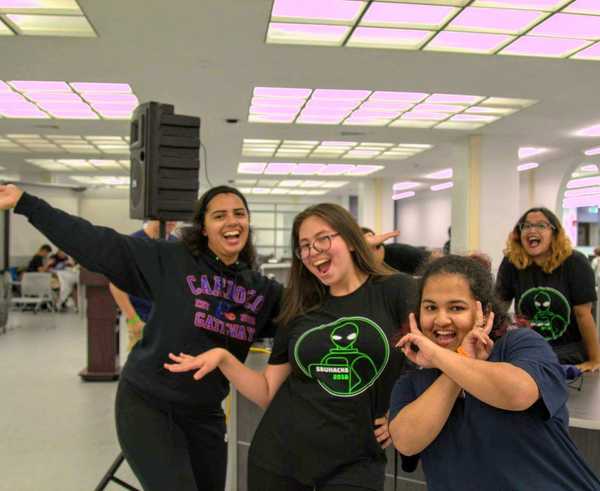“An Odyssey Conversation…” is meant to be a response to different articles posted on The Odyssey. This is intended to encourage other Odyssey contributors to discuss issues that are brought up on this website. This is not an attack on the author themselves or their views. Again, this is just a friendly discussion offering a different perspective on the matters at hand.
On January 22, 2018, an article titled It’s Time To Talk About Black Entitlement was posted. This piece first gives background to the author’s experience growing up and their views on race living in a small town. Then the author talks about their experience with applying for scholarships to pay for college. They noticed that there were no scholarships that require the applicant to be white. Later on, the article brings up a number of topics including white privilege, “black entitlement,” and black people not being past issues “that were resolved years ago.”
Now, here is my response to what was said:
I am a black woman from the city of Detroit. My primary school years were spent at predominantly black schools. Every single neighbor I’ve had growing up was black. When it came time for me to apply for scholarships, I did indeed apply for the black scholarships. These scholarships were funded by black organizations, such as Alpha Phi Alpha, or a black donor. Many white students believe that there is an unfair disadvantage with minority students when it comes to receiving financial assistance.
I came across a study by Mark Kantrowitz, publisher of FastWeb.com and FinAid.org. The study found evidence that debunks the myth, stating that Caucasian students receive more than 76% of all institutional merit-based scholarships. Also, Caucasian students are 40% more likely to win private scholarships than minority students.
This study also found “Whites Only” scholarships, which were usually created out of frustration at the lack thereof. Nationwide, about 5.5% of undergraduate students and 12.1% of students in a 4-year Bachelor’s degree program use private scholarships to fund their education. The average recipient is rewarded only $2500-$3000.
Private scholarships are highly competitive and the majority of applicants do not win a scholarship. Many will blame the scholarship committee for turning them down due to gender and/or racial preferences. This study has found that many “whites only” scholarships do not last long after the founders graduate.
“White Privilege” is not a term to instigate a so-called “battle of races.” It is used for societal privileges (not to be confused with economic privileges) that benefit white people in some countries.
The concept of white privilege first arose in 1935 when W.E.B. Dubois wrote in Black Reconstruction of America about a concept of “psychological wage” for white laborers. Although they received a low wage, they still benefited from societal privileges, such as having “the newspapers specialized on news that flattered the poor whites and almost utterly ignored the Negro except in crime and ridicule.”
In the late 80s, the term “white privilege” became popular within academic circles when Peggy McIntosh, a Wellesley College Senior Research Associate, published an essay called White Privilege: Unpacking the Invisible Knapsack. This is to say, white privilege is not a new concept that has come up in the past few years. It has been mentioned in times of racial divide and eras of “racial progression.” This goes to show that white people were being afforded societal benefits no matter what decade they are in.
The article goes on to discuss the main issue at hand, “Black Entitlement.” Here is a selection from the article in which the author states their opinion on Black Entitlement:
“While black people are victims, suffering and having to work twice as hard for everything they have. This may very well have been the case 20 years ago. But today, a different race is taking on the privileged reputation. This is what we call black entitlement.
To explain this controversial statement, the reason I say black entitlement is so prominent in our society today is mostly due to, in my opinion, the accustomed nature of the black stereotype. The idea that the past cannot remain in the past. It is accepted for blacks to play the “victim” role and to point fingers for issues that were resolved years ago.
In our society today, it’s okay for blacks to have exclusive scholarships, holidays and organizations. But if the white race were to accustom even one of these, it would be racist and discriminative. They would be known as advantages and privileges, not opportunities.”
After reading this, I was honestly left dumbfounded, confused, and a little angered by the obvious dismissal of the black struggle. We are constantly being told to “get over” racial issues, because allegedly we got our rights years ago. And just because it's socially acceptable for us to say the n-word, does not mean we automatically have privilege. And just because we are wanting the same equal treatment as our white counterparts, does not mean we feel “entitled.” Feeling entitled to equal treatment? I laughed while typing that.
It’s redundant to be upset over Black History Month, a month created for black people to specifically learn about our history and prominent black figures. Just because Black History Month teaches black history doesn’t mean white people are excluded from learning black history!
Also, the National Association for the Advancement of Colored People does not exclude white people from joining. Even the Black Caucus at my university does not exclude non-black students to join. Black organizations are created for us by us, not to specifically exclude non-black students, but to give us a safe space to exist freely and unapologetically as black folk.
Anything created for black people is not created for the sole purpose of excluding non-black people, but rather, they are there as tools to uplift the black community.



















